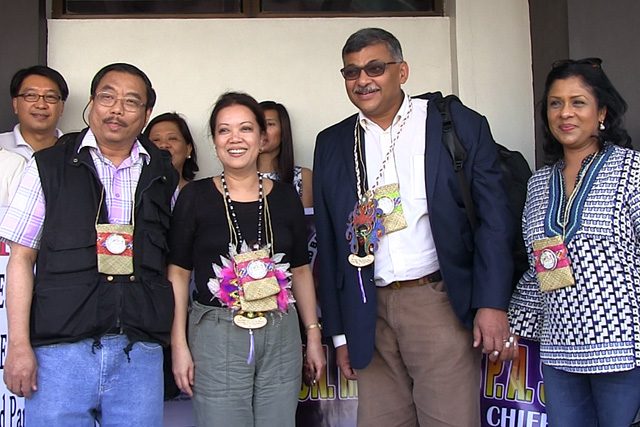SUMMARY
This is AI generated summarization, which may have errors. For context, always refer to the full article.

BORACAY, Philippines – Supreme Court (SC) Chief Justice Maria Lourdes Sereno is the only female country representative in a gathering of judiciary leaders from the Association of Southeast Asian Nations (ASEAN).
Sereno has been the only female chief justice in ASEAN since 2012, representing a country still struggling to create gender balance in top-level government positions.
Expected to be discussed in the 3rd ASEAN Chief Justices Meeting, which started Sunday, March 1, in Boracay, is the continued use of court technology in case management – among Sereno’s reform priorities in her term as the High Court’s chief. (READ: Sereno wants more funds for faster case disposal)
In the SC’s history, there have only ever been 14 women who have successfully secured an SC associate justice seat.
While more women are employed as workers and division clerks in the Philippine judiciary, only one-third of judges and justices are women, state figures show.
The high-level meeting where Sereno is the sole female primary country representative will be held in a 5-star hotel here in Boracay island, Aklan.
Dignitaries attending 3rd ASEAN Chief Justices Meeting in Boracay also welcomed by local tribal dancers #Rappler pic.twitter.com/eZkHniPpqQ
— Buena Bernal (@buenabernal) March 1, 2015The Muñoz-Palma legacy lives on
Court observers have said Sereno has stayed true to the legacy of women justices in the SC, such as the first female justice Cecilia Muñoz-Palma. Palma penned decisions which were unfavorable to her appointer, former president Ferdinand Marcos.
The Sereno court has issued decisions not exactly to the liking of President Benigno Aquino III, who defied tradition when he gave Sereno her post. These include declaring unconstitutional key acts under the Aquino administration’s spending program, the Disbursement Acceleration Program (DAP).
A chief justice’s loyalty is to the Constitution and not to the appointing power, Sereno had said of such SC decisions.
Local court officials hold welcome banner as they await arrival of Chief Justice Sereno, other dignitaries #Rappler pic.twitter.com/wN6vjOc0iQ
— Buena Bernal (@buenabernal) March 1, 2015Court observers weigh in
Ateneo School of Government Dean Tony La Viña observed that Sereno has exhibited independence, fidelity to the rule of law, and brilliance in decision-making during her first two years as chief justice.
With decisions that are “consistently intelligent” and “faithful to the rule of law,” Sereno has “definitely” stayed true to the legacy of previous female SC justices Palma and Ameurfina Aguinaldo Melencio-Herrera, he said.
Sereno’s term is not without its share of controversies, as her appointment as chief justice bypassed other more senior justices.
La Viña, however, said Sereno has “stood up against her colleagues,” including then Chief Justice Renato Corona, even when she was still an associate justice. He cited her dissent to the SC’s temporary halt of the justice department’s order barring former President, now Pampanga representative, Gloria Macapagal-Arroyo from seeking medical treatment abroad.
Young lawyer Dianna Louise Wilwayco, the top female bar-passer during the 2013 Bar Examinations, believes Sereno “epitomizes independence and integrity, not just in the decisions she writes, but in the way she leads the Court.”
“She is an admirable woman and leader. She’s one of the few appointees who did not let the opinion of the person appointing her sway her from her mandate and duties as a member of the High Court,” she said, citing how the SC stood its ground in the DAP decision.
“CJ Sereno mentioned that we need more women leaders and ethical practitioners, so as to keep the people’s faith in the administration of justice,” Wilwayco recalled of the lesson she learned from Sereno speaking to the Lex Athenia Victoria society.
CJ Sereno arrives at Caticlan airport for 3rd ASEAN Chief Justices Meeting #Rappler pic.twitter.com/rYiEYxi4xt
— Buena Bernal (@buenabernal) March 1, 2015Gender balance in the PH public sector
Legislative attempts in Congress to create gender balance in the public sector have surfaced in the past.
Notably, a bill was introduced in the 13th Philippine Congress proposing a quota system where 30% of appointive and elective government positions are given to women.
With a proposed policy similar to an affirmative action, its authors argued in a position paper that government “executive level positions are still an almost exclusive club for men.” – Rappler.com
Add a comment
How does this make you feel?
There are no comments yet. Add your comment to start the conversation.